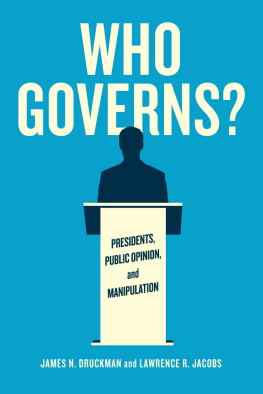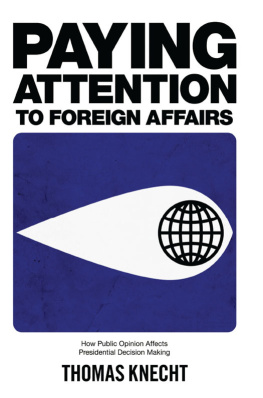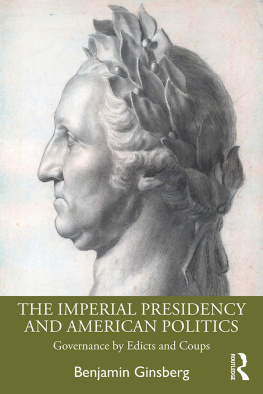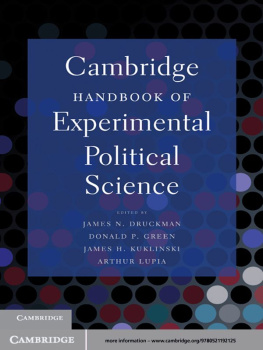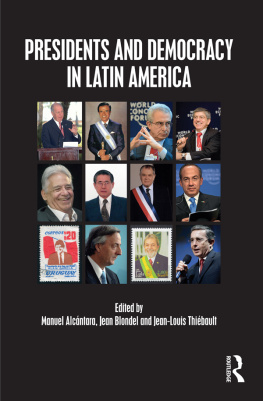Who Governs?
Chicago Studies in American Politics
A SERIES EDITED BY BENJAMIN I. PAGE, SUSAN HERBST, LAWRENCE R. JACOBS, AND ADAM J. BERINSKY
Also in the series:
TRAPPED IN AMERICAS SAFETY NET: ONE FAMILYS STRUGGLE by Andrea Louise Campbell
ARRESTING CITIZENSHIP: THE DEMOCRATIC CONSEQUENCES OF AMERICAN CRIME CONTROL by Amy E. Lerman and Vesla M. Weaver
HOW THE STATES SHAPED THE NATION: AMERICAN ELECTORAL INSTITUTIONS AND VOTER TURNOUT, 19202000 by Melanie Jean Springer
THE AMERICAN WARFARE STATE: THE DOMESTIC POLITICS OF MILITARY SPENDING by Rebecca U. Thorpe
CHANGING MINDS OR CHANGING CHANNELS? PARTISAN NEWS IN AN AGE OF CHOICE by Kevin Arceneaux and Martin Johnson
TRADING DEMOCRACY FOR JUSTICE: CRIMINAL CONVICTIONS AND THE DECLINE OF NEIGHBORHOOD POLITICAL PARTICIPATION by Traci Burch
WHITE-COLLAR GOVERNMENT: THE HIDDEN ROLE OF CLASS IN ECONOMIC POLICY MAKING by Nicholas Carnes
HOW PARTISAN MEDIA POLARIZE AMERICA by Matthew Levendusky
THE POLITICS OF BELONGING: RACE, PUBLIC OPINION, AND IMMIGRATION by Natalie Masuoka and Jane Junn
POLITICAL TONE: HOW LEADERS TALK AND WHY by Roderick P. Hart, Jay P. Childers, and Colene J. Lind
THE TIMELINE OF PRESIDENTIAL ELECTIONS: HOW CAMPAIGNS DO (AND DO NOT) MATTER by Robert S. Erikson and Christopher Wlezien
LEARNING WHILE GOVERNING: EXPERTISE AND ACCOUNTABILITY IN THE EXECUTIVE BRANCH by Sean Gailmard and John W. Patty
Who Governs?
Presidents, Public Opinion, and Manipulation
JAMES N. DRUCKMAN AND LAWRENCE R. JACOBS
THE UNIVERSITY OF CHICAGO PRESS
CHICAGO AND LONDON
JAMES N. DRUCKMAN is the Payson S. Wild Professor of Political Science and Faculty Fellow at the Institute for Policy Research at Northwestern University and an honorary professor of political science at Aarhus University in Denmark.
LAWRENCE R. JACOBS is the Walter F. and Joan Mondale Chair for Political Studies at the Humphery School of Public Affairs and the Department of Political Science at the University of Minnesota.
The University of Chicago Press, Chicago 60637
The University of Chicago Press, Ltd., London
2015 by The University of Chicago
All rights reserved. Published 2015
Printed in the United States of America
24 23 22 21 20 19 18 17 16 15 1 2 3 4 5
ISBN -13: 978-0-226-23438-0 (cloth)
ISBN -13: 978-0-226-23441-0 (paper)
ISBN -13: 978-0-226-23455-7 (e-book)
DOI : 10.7208/chicago/9780226234557.001.0001
Library of Congress Cataloging-in-Publication Data
Druckman, James N., 1971 author.
Who governs? : presidents, public opinion, and manipulation / James N. Druckman and Lawrence R. Jacobs.
pages cm (Chicago studies in American politics)
ISBN 978-0-226-23438-0 (cloth : alk. paper) ISBN 978-0-226-23441-0 (pbk. : alk. paper) ISBN 978-0-226-23455-7 (e-book) 1. Presidents United States. 2. DemocracyUnited States. 3. Public opinionUnited States. 4. United StatesPolitics and government. I. Jacobs, Lawrence R., author. II. Title. III. Series: Chicago studies in American politics.
JK 516. D 793 2015
320.973 dc23
2014026787
This paper meets the requirements of ANSI/NISO Z 39.48-1992 (Permanence of Paper).
THIS BOOK IS DEDICATED TO JOHN TRYNESKI, EXECUTIVE EDITOR AT THE UNIVERSITY OF CHICAGO PRESS, WHO HAS DEVOTED HIS CAREER TO CONVERTING THE WORDS, IDEAS, AND RESEARCH OF SCHOLARS INTO KNOWLEDGE OF IMPORTANCE.
Contents
A s the twenty-first century dawned, America faced new and serious threats to its economy and stature in the world. Al Qaedas attacks on September 11, 2001, on New York Citys World Trade Center and the Pentagon in Washington, DC, were unprecedented assaults and precipitated a series of momentous decisions by President George W. Bushwith support from congressional Republicans and Democratsto launch what were expected to be short wars against Afghanistan (to deny a launching pad for terrorists) and, later, Iraq (to eliminate the threat of Saddam Hussein using weapons of mass destruction). By 2013, the wars had cost the lives of over seventy-one hundred Americans as well as nearly fifty thousand casualties (many quite severe) and run up a price tag of $4$6 trillionfar above initial Bush administration estimates of $200 billion (Londono 2013; Iraq and Afghanistan Casualty Count, n.d.; Carter and Cox 2011). Despite the wars high price, their outcomes remain decidedly mixed. Al Qaeda and its Taliban hosts were routed in Afghanistan, but experts worry that they are returning as US troops leave. Saddam Hussein was toppled, but the main rationale for the war (the existence of weapons of mass destruction) proved unfounded, Iraq is gripped by autocratic rule and instability rather than leading the global democratic revolution that President Bush anticipated, and, without Saddam Hussein serving as a counterbalance, Iran widened its influence and threat to American interests and allies in the Middle East (Friedman and Mandelbaum 2011).
Meanwhile, on Americas domestic front, long-simmering and at times willfully neglected challenges burst into financial contagion in 2007 and would quickly decimate the economy in ways that experts compared to the Great Depression of the 1930s. With regulations weakened in the late 1990s or left unenforced over the next decade, home mortgages were sold to millions who could not afford them in violation of financial guidelines, and, compounding the problem, these high-risk mortgages were then traded among banks and other financial institutions under the false guise of being safe investments. By 2007, conditions were in place for an extraordinary economic implosion: the tightening economy prevented vulnerable homeowners from making mortgage payments, which in turn made it impossible for growing sections of the financial industry to make payments on trillions of dollars of mortgage-based securities. Credit froze, and banks and other financial investors lacked safety cushions that had been a standard protection against poor investments. As 2008 unfolded, a contagion started by homeowners unable to pay off mortgages spread to the housing industry and started to infect a growing number of banks and other financial institutions. As over one hundred bankruptcies struck mortgage lenders and drained the solvency of the countrys largest financial institutionsfrom Bear Stearns to Merrill Lynch and the insurance giant AIGthe otherwise antigovernment and promarket administration of George W. Bush instigated unprecedented steps to prevent a Herbert Hoover catastropheas Vice President Richard Cheney warned Republican members of Congress (Raju 2008). As the global financial system teetered on the brink of collapse following the demise of Lehman Brothers in October 2008, the Bush administration pushed through an emergency rescue packagethe Troubled Asset Relief Programthat ignited both liberal complaints against bailouts of banks and conservative outrage at the betrayal of small government principles, helping ignite the Tea Party movement. The banking sector stabilized, but businesses and consumers were rattled, pulled back on spending, and stalled the housing and other sectors of the economy. For six months beginning in November 2008, more than half a million jobs were lost per month, and 5.2 million jobs disappeared in the year after the crisis began in September 2008, producing the highest level of unemployment in three decades.
As the economy nose-dived, the governments long-standing fiscal mismanagement became readily apparent. Demands by conservative and other lawmakers to cut taxes and expand exemptions for favored interests contributed to reducing the share of income that Americans paid in taxes to the lowest level since 1958; the most affluent saw their marginal rates cut to 33 percent or lower after having been about 90 percent from the 1940s through the early 1960s. Meanwhile, the governments expenditures rose as the costs of the Afghanistan and Iraq Wars came due without new funds to pay them; Social Security and Medicare covered a growing number of aging Americans who had contributed to the programs during their working lives and lost savings in the financial crises; and the safety net kicked in to prevent millions from falling into deep deprivation owing to the sinking economy.

